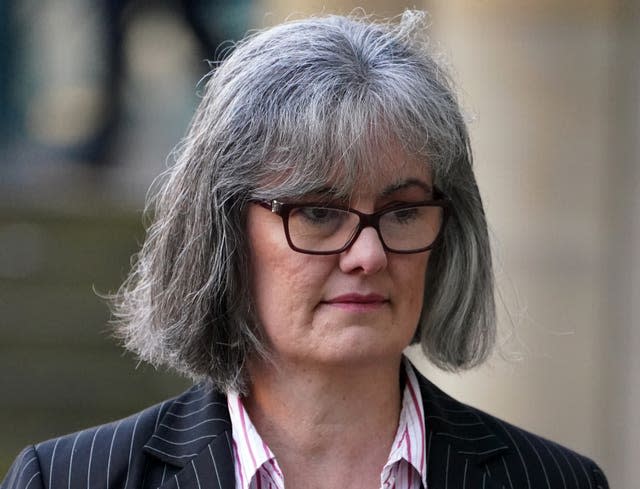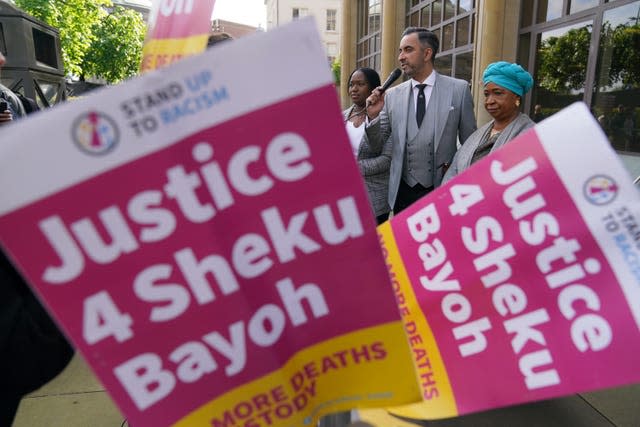‘Reasonable officer’ facing man appearing high ‘would seek medical attention’
A “reasonable officer” confronted with a man approaching them with bulging eyes who appeared high would have considered seeking medical treatment, the inquiry into the death of a man who was restrained by police has heard.
Joanne Caffrey, an expert witness on the use of force and police custody, told the Sheku Bayoh inquiry in Edinburgh on Wednesday that if a hypothetical “reasonable officer” was approached by such a man they would have contacted the control room to alert them to the fact.
Father-of-two Mr Bayoh died after he was detained by six police officers who restrained him on the ground in Kirkcaldy, Fife, on May 3 2015.
His family believes race played a part in his death.

Pc Craig Walker and Pc Alan Paton were first on the scene after reports from members of the public that T-shirt-wearing Mr Bayoh had been carrying a knife and attacking vehicles.
Previously they told the inquiry that when they arrived at Hayfield Road they rapidly deployed their incapacitant sprays on the gas engineer after he failed to listen to their instructions, and Pc Paton said that when he arrived he thought Mr Bayoh was “clearly in some sort of rage or zombie state”.
Angela Grahame KC, the inquiry’s senior counsel, put a scenario to Ms Caffrey of a man wearing a T-shirt in freezing weather, walking briskly with “eyes bulging out of his head”, who had no visible knife, already walking towards a police van when they arrived, who one officer became aware was “high on something”.
Asked what level of response a “reasonable officer” would consider appropriate, Ms Caffrey said: “I think that they would be thinking about that, is this a person who’s under the influence of intoxication and or mental illness, and I need to get them medical attention.
“So: ‘Control, we need an ambulance’, ‘Hey guy, I want to help you, how can I help you’ and look at that initial engagement as to can you get a rapport with the person and stress to them we’re here to help, but still keeping all the distance because you don’t know whether there’s a weapon involved or not.”
She told the inquiry, chaired by Lord Bracadale, that alerting the area control room would have taken seconds.
The retired police officer, who has now been involved in more than 150 case reports over the past five years involving deaths in custody, police custody procedures and use of force, and more, took the inquiry through a range of options open to the “reasonable officer” confronted by the scenario of the events leading up to Mr Bayoh’s arrest and death.
These included meeting at a rendezvous point before going to the scene, which she said would give time to “discuss rapidly tactical options” and wait for more officers to arrive, and also a method of observing, waiting, and feeding back to area commanders in the control room.

Ms Caffrey told the inquiry that the “primary focus for dealing with any kind of bladed weapon is contain rather than restrain” but to do so you needed more than two officers.
“If four or six turned up together, you have got a really good chance of containment,” she said, and added it was a “preferred option unless it can be shown why it wasn’t”.
The inquiry heard Ms Caffrey agreed it would have been reasonable for armed response vehicles to have been contacted, and for them not to be deployed but to have waited for feedback.
The inquiry also heard how a dog unit being on scene can affect a suspect. On the day, a dog unit had been called for.
Ms Caffrey said it was not reasonable for just one unit to attend, because it was an incident above the level described as “business as usual” given the reports that a knife was involved.
Circumstances were put to Ms Caffrey through the lens of what a hypothetical “reasonable officer” would do.
Ms Caffrey agreed a reasonable officer would only use force which was reasonable, proportionate, and the minimum necessary.
She also agreed that the least forceful option must be attempted or considered and found to be inappropriate in the circumstances before other methods are considered.
The inquiry continues on Thursday, when Ms Caffrey is set to continue her evidence.

 Yahoo Movies
Yahoo Movies 
